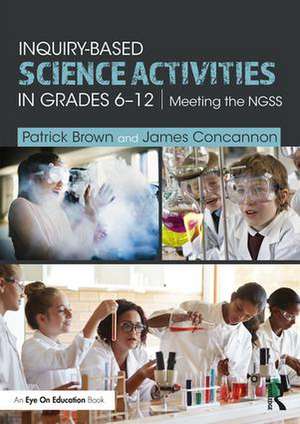Inquiry-Based Science Activities in Grades 6-12: Meeting the NGSS
Autor Patrick Brown, James Concannonen Limba Engleză Paperback – 27 mar 2018
| Toate formatele și edițiile | Preț | Express |
|---|---|---|
| Paperback (1) | 229.39 lei 43-57 zile | |
| Taylor & Francis – 27 mar 2018 | 229.39 lei 43-57 zile | |
| Hardback (1) | 668.00 lei 43-57 zile | |
| Taylor & Francis – 29 mar 2018 | 668.00 lei 43-57 zile |
Preț: 229.39 lei
Nou
Puncte Express: 344
Preț estimativ în valută:
43.89€ • 45.94$ • 36.53£
43.89€ • 45.94$ • 36.53£
Carte tipărită la comandă
Livrare economică 31 martie-14 aprilie
Preluare comenzi: 021 569.72.76
Specificații
ISBN-13: 9780815383376
ISBN-10: 0815383371
Pagini: 142
Ilustrații: 20 Tables, black and white; 72 Illustrations, black and white
Dimensiuni: 174 x 246 x 8 mm
Greutate: 0.25 kg
Ediția:1
Editura: Taylor & Francis
Colecția Routledge
Locul publicării:Oxford, United Kingdom
ISBN-10: 0815383371
Pagini: 142
Ilustrații: 20 Tables, black and white; 72 Illustrations, black and white
Dimensiuni: 174 x 246 x 8 mm
Greutate: 0.25 kg
Ediția:1
Editura: Taylor & Francis
Colecția Routledge
Locul publicării:Oxford, United Kingdom
Public țintă
Professional Practice & DevelopmentCuprins
Contents
Meet the Authors
Introduction
Chapter 1: What are the features of evidence-driven inquiry?
Chapter 2: Next Generation Science Standards (NGSS)
Chapter 3: How Thin Is Tin Foil?
Chapter 4: An Interdisciplinary Theme
Chapter 5: Students’ Use of the PSOE Model to Understand Weather and Climate
Chapter 6: Teaching Bernoulli’s Principle through Demos
Chapter 7: Gravity Is Easy to Understand, Right? The Difference between Calculating and Comprehending
Chapter 8: Students Investigations in Temperature and Pressure
Chapter 9: 2-Liter Bottles and Botanical Gardens: Using Inquiry to Learn Ecology
Chapter 10: Students Conceptualizing Transcription and Translation from a Cellular Perspective
Chapter 11: Are You Teaching Your Students about Stem Cells?
Chapter 12: Transforming Osmosis: Labs to Address Standards for Inquiry
Chapter 13: Lessons Learned
Meet the Authors
Introduction
Chapter 1: What are the features of evidence-driven inquiry?
Chapter 2: Next Generation Science Standards (NGSS)
Chapter 3: How Thin Is Tin Foil?
Chapter 4: An Interdisciplinary Theme
Chapter 5: Students’ Use of the PSOE Model to Understand Weather and Climate
Chapter 6: Teaching Bernoulli’s Principle through Demos
Chapter 7: Gravity Is Easy to Understand, Right? The Difference between Calculating and Comprehending
Chapter 8: Students Investigations in Temperature and Pressure
Chapter 9: 2-Liter Bottles and Botanical Gardens: Using Inquiry to Learn Ecology
Chapter 10: Students Conceptualizing Transcription and Translation from a Cellular Perspective
Chapter 11: Are You Teaching Your Students about Stem Cells?
Chapter 12: Transforming Osmosis: Labs to Address Standards for Inquiry
Chapter 13: Lessons Learned
Notă biografică
Dr. Patrick Brown, PhD is the STEM coordinator for the Fort Zumwalt School District in O’Fallon, Missouri.
Dr. James Concannon, PhD is a science teacher educator at Westminster College in Fulton, Missouri.
Dr. James Concannon, PhD is a science teacher educator at Westminster College in Fulton, Missouri.
Recenzii
"This resource is an informative, thought-provoking read, and it’s essential for anyone serious about understanding the science education research that supports the NGSS."
—Victoria May, Assistant Dean of Arts & Sciences, Washington University in St. Louis
"I like the way Brown and Concannon articulate the importance and usefulness of evidence-based inquiry for teachers and students. Their emphasis on 'understanding from experiences' is refreshingly reminiscent of John Dewey and the need to not only have a child’s experience at the center of our teaching but to also showcase the importance of 'Science as method' not just as subject matter. This book is very useful for teachers as they work to engage learners in science by 'providing students with immediate experiences to form accurate understandings'."
—Robert W. Blake, Jr. Professor and Chair, Towson University
—Victoria May, Assistant Dean of Arts & Sciences, Washington University in St. Louis
"I like the way Brown and Concannon articulate the importance and usefulness of evidence-based inquiry for teachers and students. Their emphasis on 'understanding from experiences' is refreshingly reminiscent of John Dewey and the need to not only have a child’s experience at the center of our teaching but to also showcase the importance of 'Science as method' not just as subject matter. This book is very useful for teachers as they work to engage learners in science by 'providing students with immediate experiences to form accurate understandings'."
—Robert W. Blake, Jr. Professor and Chair, Towson University
Descriere
This new book shows middle and high school science teachers how to use evidence-based inquiry to help students achieve deeper conceptual understanding.
